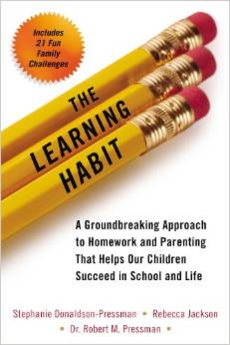
I was inspired to write this article after reading Jessica Lahey's article in the New York Times, "Autonomy Works Best for The Classroom." Lahey, a public school teacher and author of the forthcoming book, The Gift of Failure, believes overzealous parents who manage their children's homework may be encouraging children to give up easily and quit when the work becomes challenging.
No parent wants to intentionally sabotage their child's chances for academic success. As the fabulous Marlo Thomas and Tom Smothers remind us in the classic song "Helping" from "Free To Be You And Me":

"Some kind of help is the kind of help that helpings all about. And some kind of help is the kind of help, we all can do without!"
There are some techniques parents can use that do encourage learning. Parents can give children "the right" kind of help by systematically reinforcing habits that help rather than hinder the learning process.
Here are five homework strategies to try with your child when you have only five minutes!
1. Use Internal Motivation: In journalist Paul Tough's book How Children Succeed: Grit, Curiosity and the Hidden Power of Character, his research emphasizes the importance of internal motivation in success. After all, some children simply don't care about homework, and their school performance suffered because of this lack of effort. When these children are told that intelligence is malleable and that they can actually improve their brains by exerting themselves, they tended to try harder.
2. Use The Power of Habit to Relax: In the book I co-authored, The Learning Habit: A groundbreaking Approach to Homework and Parenting That Helps Our Children Succeed in School and Life (Perigee books), the authors offer a unique approach to homework time. Have children and parents decide on an amount of time they will spend on homework each day. Usually it's 10 minutes per grade. Use a timer to track it. When the timer goes off, they're done. The authors decrease stress by having a clear "beginning" and "ending" to homework time. This is how a homework habit is formed.
"We're not learning when we're being assisted by our parents. Parents need to step back from focusing on the outcome -- the completed, corrected assignment -- and focus on the effort." - The Learning Habit
3. Change of Mind: In Mindset: The New Psychology of Success, author and psychologist Carol Dweck explains why it's not just our abilities and talent that bring us success, but whether we approach them with a fixed or growth mindset. She makes clear why praising intelligence and ability doesn't foster self-esteem and lead to accomplishment, but may actually jeopardize success. With the right mindset, we can motivate our kids and help them to raise their grades, as well as reach our own goals-personal and professional. During homework time, try offering praise for effort rather than outcome.
4. Stop Multi-tasking and Focus: In the book Why Don't Students Like School: A Cognitive Scientist Answers Questions About How the Mind Works and What It Means for the Classroom, Daniel T. Willingham believes if you care about what you're doing, focus on it! Leaving a TV on as background noise is distracting. Background music can help or hurt, depending on the "type of music, type of task, type of person, or a combination of factors is still unknown." Willingham offers a detailed perspective on education in the United States -- this is a must-read for any parent.
5. Wait: We are not talking about procrastination; this is planned waiting. In Make It Stick: The Science of Successful Learning by Peter C. Brown, Henry L. Roediger and Mark A. McDaniel, the authors bring up a counter-intuitive strategy that helps reinforce learning. Parents can intentionally build in a "Wait Time." Rather than cramming learning into one evening or even one week, parents can work with children and teachers to build in wait time to allow students time to re-study material until a little forgetting has set in.
If you have more than five minutes and enjoy a good read, any of the above titles would make a welcome addition to your bookshelf. Please feel free to add to this list. If you have a great piece of advice regarding homework or an educational book you'd like to recommend, please list in in the comments section below.

The Learning Habit by Stephanie Donaldson-Pressman, Rebecca Jackson, and Dr. Robert Pressman
Copyright © 2014 by Good Parent, Inc.